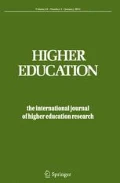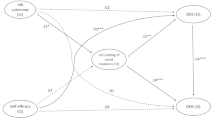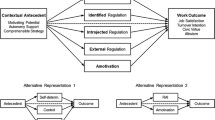Abstract
We examine the relationships between job characteristics (job autonomy, skill variety, role conflict), work-related attitudes (job satisfaction, organizational commitment, trust in the employer), and organizational citizenship behaviors (civic virtue and altruism) among faculty at UAE-based universities. Data were obtained from 249 participants at 26 universities. Path analysis revealed, as predicted, that job autonomy, skill variety, and role conflict impact faculty job satisfaction, organizational commitment, and trust. Also, when job satisfaction, organizational commitment, and trust were examined simultaneously as mediators of the job characteristics-citizenship relationship, only organizational commitment was significant. Job autonomy had both direct and indirect effects on civic virtue, but only an indirect effect on altruism. Skill variety had direct and indirect effects on both civic virtue and altruism; whereas, role conflict had only indirect effects on these outcomes. The practical and theoretical implications of these findings are discussed and directions for future research are offered.


Similar content being viewed by others
References
Ababneh, K. I. (2016). Effects of met expectations, trust, job satisfaction, and commitment on faculty turnover intentions in the United Arab Emirates (UAE). The International Journal of Human Resource Management, 1–32.
Ababneh, K. I., & Al-Waqfi, M. A. (2016). The role of privacy invasion and fairness in understanding job applicant reactions to potentially inappropriate/discriminatory interview questions. Personnel Review, 45(2), 392–418.
Ababneh, K. I., Hackett, R. D., & Schat, A. C. (2014). The role of attributions and fairness in understanding job applicant reactions to selection procedures and decisions. Journal of Business and Psychology, 29(1), 111–129.
Alajoutsijärvi, K., Juusola, K., & Lamberg, J. (2013). Institutional logic of business bubbles: lessons from the Dubai business school mania. Academy of Management Learning & Education, 13(1), 5–25.
Altbach, P. G. (2001). Academic freedom: international realities and challenges. Higher Education, 41(1–2), 205–219.
Austin, A. E., Chapman, D. W., Farah, S., Wilson, E., & Ridge, N. (2014). Expatriate academic staff in the United Arab Emirates: the nature of their work experiences in higher education institutions. Higher Education, 68(4), 541–557.
Barnes, L. L., Agago, M. O., & Coombs, W. T. (1998). Effects of job-related stress on faculty intention to leave academia. Research in Higher Education, 39(4), 457–469.
Baruch, Y., & Forstenlechner, I. (2017). Global careers in the Arabian Gulf: understanding motives for self-initiated expatriation of the highly skilled, globally mobile professionals. Career Development International, 22(1), 3–22.
Bateman, T. S., & Organ, D. W. (1983). Job satisfaction and the good soldier: the relationship between affect and employee “citizenship”. Academy of Management Journal, 26(4), 587–595.
Blau, P. M. (1964). Exchange and power in social life. New York: Wiley.
Bolino, M. C., Hsiung, H.-H., Harvey, J., & LePine, J. A. (2015). “Well, I’m tired of tryin’!” Organizational citizenship behavior and citizenship fatigue. Journal of Applied Psychology, 100(1), 56–74.
Bycio, P. (1992). Job performance and absenteeism: a review and meta-analysis. Human Relations, 45, 193–220.
Bynum, L. A., Bentley, J. P., Holmes, E. R., & Bouldin, A. S. (2012). Organizational citizenship behaviors of pharmacy faculty: modeling influences of equity sensitivity, psychological contract breach, and professional identity. Journal of Leadership, Accountability and Ethics, 9(5), 99–111.
Cappelli, P., & Rogovsky, N. (1998). Employee involvement and organizational citizenship: implications for labor law reform and “Lean Production”. ILR Review, 51(4), 633–653.
Center for Higher Education Data and Statistics (CHEDS) (2012). Indicators of the UAE higher education sector report. http://www.cheds.ae. Accessed January 18, 2018.
Chen, C.-C., & Chiu, S.-F. (2009). The mediating role of job involvement in the relationship between job characteristics and organizational citizenship behavior. The Journal of Social Psychology, 149(4), 474–494.
Chiu, S.-F., & Chen, H.-L. (2005). Relationship between job characteristics and organizational citizenship behavior: the mediational role of job satisfaction. Social Behavior and Personality: An International Journal, 33(6), 523–540.
Conway, J. M., & Lance, C. E. (2010). What reviewers should expect from author regarding common method bias in organizational research. Journal of Business Psychology, 25, 325–334.
Cropanzano, R., & Mitchell, M. S. (2005). Social exchange theory: an interdisciplinary review. Journal of Management, 31(6), 874–900.
Cropanzano, R., Anthony, E., Daniels, S., & Hall, A. (2016). Social exchange theory: a critical review with theoretical remedies. Academy of Management Annals, 11(1), 1–38.
Daly, C. J., & Dee, J. R. (2006). Greener pastures: faculty turnover intent in urban public universities. The Journal of Higher Education, 77(5), 776–803.
Deci, E. L., Connell, J. P., & Ryan, R. M. (1989). Self-determination in a work organization. Journal of Applied Psychology, 74(4), 580–590.
Dee, J. R., Henkin, A. B., & Chen, J. H.-H. (2000). Faculty autonomy: perspectives from Taiwan. Higher Education, 40(2), 203–216.
Dirks, K. T., & Ferrin, D. L. (2002). Trust in leadership: meta-analytic findings and implications for research and practice. Journal of Applied Psychology, 87(4), 611–628.
Drago, R., & Garvey, G. T. (1998). Incentives for helping on the job: theory and evidence. Journal of Labor Economics, 16(1), 1–25.
Ertürk, A. (2007). Increasing organizational citizenship behaviors of Turkish academicians: mediating role of trust in supervisor on the relationship between organizational justice and citizenship behaviors. Journal of Managerial Psychology, 22(3), 257–270.
Farh, J.-L., Podsakoff, P. M., & Organ, D. W. (1990). Accounting for organizational citizenship behavior: leader fairness and task scope versus satisfaction. Journal of Management, 16(4), 705–721.
Gormley, D. K. (2003). Factors affecting job satisfaction in nurse faculty: a meta-analysis. Journal of Nursing Education, 42(4), 174–178.
Hackman, J. R., & Oldham, G. R. (1976). Motivation through the design of work: test of a theory. Organizational Behavior and Human Performance, 16(2), 250–279.
Hackman, J. R., & Oldham, G. R. (1980). Work redesign. Reading: Addison-Wesley.
Harper, P. J. (2015). Exploring forms of organizational citizenship behaviors (OCB): antecedents and outcomes. Journal of Management and Marketing Research, 18, 1–16.
Jillapalli, R. K., & Wilcox, J. B. (2010). Professor brand advocacy: do brand relationships matter? Journal of Marketing Education, 32(3), 328–340.
Johnsrud, L. K., & Rosser, V. J. (2002). Faculty members’ morale and their intention to leave: a multilevel explanation. The Journal of Higher Education, 73(4), 518–542.
Konovsky, M. A., & Pugh, S. D. (1994). Citizenship behavior and social exchange. Academy of Management Journal, 37(3), 656–669.
Lawrence, J., Ott, M., & Bell, A. (2012). Faculty organizational commitment and citizenship. Research in Higher Education, 53(3), 325–352.
Lewin, T. (2009). University branches in Dubai are struggling. The New York Times—December, 27.
Loher, B. T., Noe, R. A., Moeller, N. L., & Fitzgerald, M. P. (1985). A meta-analysis of the relation of job characteristics to job satisfaction. Journal of Applied Psychology, 70(2), 280–289.
Mazawi, A. E. (2003). Divisions of academic labor: national and non-national faculty members in Arab Gulf universities. International Journal of Contemporary Sociology, 40(1), 91–110.
Morrison, E. W. (1994). Role definitions and organizational citizenship behavior: the importance of the employee’s perspective. Academy of Management Journal, 37(6), 1543–1567.
Moye, M. J., Henkin, A. B., & Egley, R. J. (2005). Teacher-principal relationships: exploring linkages between empowerment and interpersonal trust. Journal of Educational Administration, 43(3), 260–277.
Oldham, G. R., & Hackman, J. R. (1981). Relationships between organizational structure and employee reactions: comparing alternative frameworks. Administrative Science Quarterly, 66–83.
Oldham, G. R., & Hackman, J. R. (2010). Not what it was and not what it will be: the future of job design research. Journal of Organizational Behavior, 31(2–3), 463–479.
Organ, D. W. (1988). Organizational citizenship behavior: The good soldier syndrome. Lexington: Lexington Books.
Organ, D. W. (1997). Organizational citizenship behavior: it’s construct clean-up time. Human Performance, 10(2), 85–97.
Organ, D. W., & Ryan, K. (1995). A meta analytic review of attitudinal and dispositional predictors of organizational citizenship behavior. Personnel Psychology, 48(4), 775–802.
Organ, D. W., Podsakoff, P. M., & MacKenzie, S. B. (2006). Organizational citizenship behavior: Its nature, antecedents, and consequences. Thousand Oaks: Sage Publications.
Podsakoff, P. M., MacKenzie, S. B., Moorman, R. H., & Fetter, R. (1990). Transformational leader behaviors and their effects on followers’ trust in leader, satisfaction, and organizational citizenship behaviors. The Leadership Quarterly, 1(2), 107–142.
Podsakoff, P. M., Niehoff, B. P., MacKenzie, S. B., & Williams, M. L. (1993). Do substitutes for leadership really substitute for leadership? An empirical examination of Kerr and Jermier’s situational leadership model. Organizational Behavior and Human Decision Processes, 54(1), 1–44.
Podsakoff, P. M., MacKenzie, S. B., & Bommer, W. H. (1996a). Meta-analysis of the relationships between Kerr and Jermier’s substitutes for leadership and employee job attitudes, role perceptions, and performance. City: American Psychological Association.
Podsakoff, P. M., MacKenzie, S. B., & Bommer, W. H. (1996b). Transformational leader behaviors and substitutes for leadership as determinants of employee satisfaction, commitment, trust, and organizational citize. Journal of Management, 22(2), 259–298.
Podsakoff, P. M., MacKenzie, S. B., Paine, J. B., & Bachrach, D. G. (2000). Organizational citizenship behaviors: a critical review of the theoretical and empirical literature and suggestions for future research. Journal of Management, 26(3), 513–563.
Podsakoff, N. P., Whiting, S. W., Podsakoff, P. M., & Blume, B. D. (2009). Individual-and organizational-level consequences of organizational citizenship behaviors: a meta-analysis. Journal of Applied Psychology, 94(1), 122–141.
Preacher, K. J., & Hayes, A. F. (2008). Asymptotic and resampling strategies for assessing and comparing indirect effects in multiple mediator models. Behavior Research Methods, 40(3), 879–891.
Price, J. L. (2001). Reflections on the determinants of voluntary turnover. International Journal of Manpower, 22(7), 600–624.
Robinson, S. L., & Rousseau, D. M. (1994). Violating the psychological contract: not the exception but the norm. Journal of Organizational Behavior, 15(3), 245–259.
Romanowski, M. H., & Nasser, R. (2015). Identity issues: expatriate professors teaching and researching in Qatar. Higher Education, 69(4), 653–671.
Schoepp, K., & Forstenlechner, I. (2010). The role of family considerations in an expatriate majority environment. Team Performance Management, 16(5/6), 309–323.
Schoepp, K., & Forstenlechner, I. (2012). Self-initiated expatriate faculty in the UAE: balancing the profession and financial rewards. International Journal of Business and Globalisation, 8(4), 454–470.
Spector, P. E. (1986). Perceived control by employees: a meta-analysis of studies concerning autonomy and participation at work. Human Relations, 39(11), 1005–1016.
Tabachnick, B., & Fidell, L. (2001). Using multivariate statistics (Vol. 4). Boston: Allyn & Bacon.
Todd, S. Y., & Kent, A. (2006). Direct and indirect effects of task characteristics on organizational citizenship behavior. North American Journal of Psychology, 8(2), 253–268.
Tompson, H. B., & Werner, J. M. (1997). The impact of role conflict/facilitation on core and discretionary behaviors: testing a mediated model. Journal of Management, 23(4), 583–601.
Wilkins, S., & Huisman, J. (2012). The international branch campus as transnational strategy in higher education. Higher Education, 64(5), 627–645.
Williams, L. J., & Anderson, S. E. (1991). Job satisfaction and organizational commitment as predictors of organizational citizenship and in-role behaviors. Journal of Management, 17(3), 601–617.
Acknowledgement
We thank Dr. Peter Bycio for his editorial assistance, independent review and feedback concerning an earlier draft of this manuscript.
Author information
Authors and Affiliations
Corresponding author
Rights and permissions
About this article
Cite this article
Ababneh, K.I., Hackett, R.D. The direct and indirect impacts of job characteristics on faculty organizational citizenship behavior in the United Arab Emirates (UAE). High Educ 77, 19–36 (2019). https://doi.org/10.1007/s10734-018-0252-3
Published:
Issue Date:
DOI: https://doi.org/10.1007/s10734-018-0252-3




